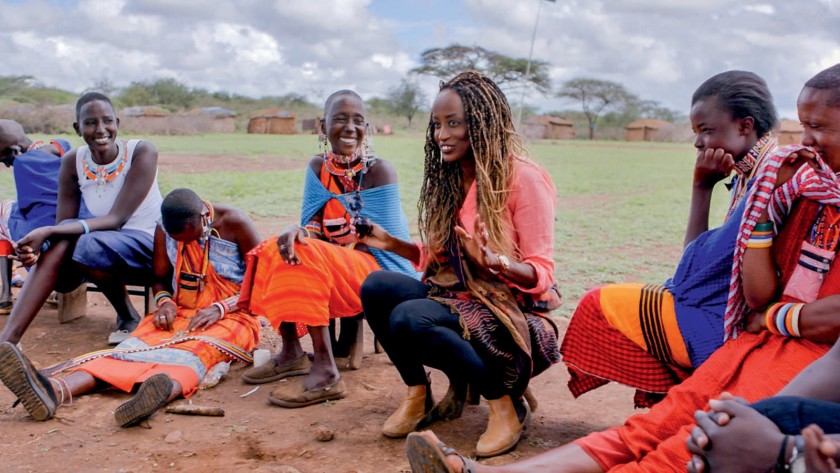#FEMALE PLEASURE
Reviewed for Shockya.com & BigAppleReviews.net linked from Rotten Tomatoes by: Harvey Karten
Director: Barbara Miller
Screenwriter: Barbara Miller
Cast: Deborah Feldman, Leyla Hussein, Rokudenashiko, Doris Wagner, Yithika Yadav
Screened at: Critics’ link, NYC, 9/23/19
Opens: October 18, 2019
During the Age of Aquarius in America, Joan Baez would sing “Hard is the fortune of all womankind/ She’s always controlled, she’s always confined/ Controlled by her parents until she’s a wife/ A slave to her husband for the rest of her life.” You might not think that in free America—as compared, for example with Saudi Arabia—that women have it so bad, but of course there’s room even in our country before we can declare the two sexes absolutely equal. Things are worse, then, in some parts of the world, and Barbara Miller, who wrote and directs “#Female Pleasure,” takes us around the globe from Brooklyn to Japan to India and to the UK and to Italy, where women activists are challenging the rules enforced upon them by religion or by culture. You come away with the impression that Karl Marx was right in saying that religion was invented by men to keep women down–though he could add repressive cultures in general.
The Swiss director hones in on five women, capturing their legitimate beefs through both the interview format and through observing them living their lives. In one case she indicts entire societies in discussing the evil practice of FGM, or female genital mutilation, in which babies, really, five-year-old girls, are held down and have their clitoris cut out so that they cannot feel sexual pleasure. Strangely, though, the women do not explain why this is done. Presumably this is to prevent women from straying from their husbands. In other cases, religion, which of course is part of a culture, is indicted, interpreted by men to pronounce themselves superior to women and to exploit them for their own satisfaction.
The woman whose story meant the most for me was Deborah Feldman, as I had read her book “Unorthodox,” there describing her view of the Hasidic religious sect in Williamsburg, Brooklyn. She was one of the few who actually left, taking off on her own, living in Greenwich Village, her book describing her dismal view of the highly Orthodox people who do not allow women to choose their mates. (I think she did a disservice on those pages in which she tells all, describing the sexual practices of her ex-husband which must have humiliated him.) Feldman is seen driving her son inside the Hasidic community, asking him whether she should return to the fold and getting the obvious answer from the young man, “Let’s get out.” And that’s a male talking! We see films of Mea Shearim, the ultra-Orthodox Jewish community in Jerusalem, where the residents post large signs about respecting the local culture. Women are told to dress modestly—long sleeve shirts, skirts down about her ankles, though what Feldman could have added is that tourists who walk through the community with outfits that the residents consider immodest are spat upon, the women addressed as whores.
At least nobody in the Hasidic culture favors FGM. The bizarre custom of cutting a woman’s genitals when she is but a small child occurs largely in North Africa—Egypt, Somalia, for example, but also in Kenya. We hear from Leyla Hussein, who had the procedure forced on her. Like Feldman, she ultimately escaped the repressiveness by moving to the UK. At the very least she has convinced women in the expate Somali community to the anti-FGM cause, and when she visited the Masai in Kenya, learning that these women too had been mutilated, she gets their pledge not to do the same to their own daughters. As for the view that, hey, men, too are mutilated by some cultures by having their foreskins removed, she counters that the equivalent would be to have their entire penises removed.
Rokudenashiko, the nickname of manga artist Megumi Igarashi which means “good for nothing,” put vaginas in her cartoons for which she was arrested, tried, and acquitted of that charge, but she was convicted for making 3D images of the vagina, creating necklaces, iPhone cases and even a kayak using her own vulva as the design.
Miller also gives time to Doris Wagner, a German nun who claims that she was raped more than once by a priest, though we wonder why she would remain in the convent after a single instance, particularly since her charge was not taken seriously. She had written to Pope Francis, receiving no response, and is now a free woman who loves pop songs which, unlike what she heard in the convent deals with real human emotions.
Vithika Yadav, a feminist activist in India, makes us aware that the government in India appears not to take rape seriously, thinking, perhaps, that “Boys will be boys.” A street demonstration cast with men sympathetic to her cause reenacts the humiliation that women go through.
Some might say that the film is “all over the place,” since it deals with a variety of themes from genital mutilation to arranged marriage, but all falls under the umbrella of ways that women are not valued as much as are men, looked upon—except by me and you—as nothing more than baby-making machines whose pleasure is considered unimportant by men. If you are “woke,” i.e. socially aware, you know and rejects the attitude of male supremacy unearthed by this fascinating trip around the globe. Even so, you will be attentive to the sharp visuals in Jiro Akiba, Gabriela Betschart and Anne Misselwitz’s photography.
The film garnered awards and nominations at film festivals in Locarno, Leipzig, Austria and Thessalonika.
101 minutes. © 2019 by Harvey Karten, Member, New York Film Critics Online
Story – A-
Acting – A-
Technical – B+
Overall – A-

